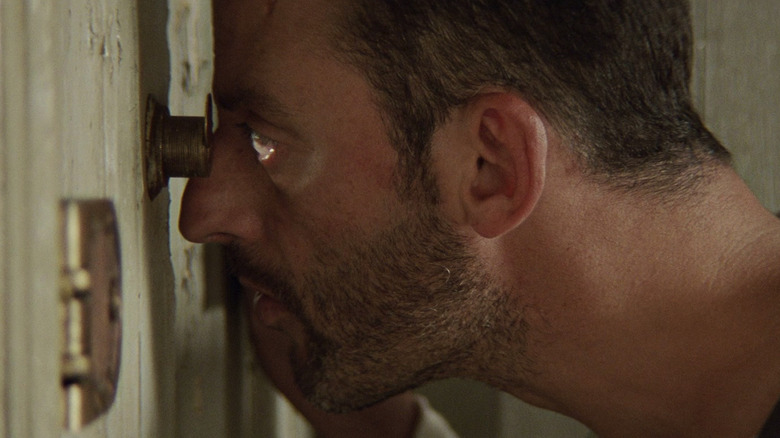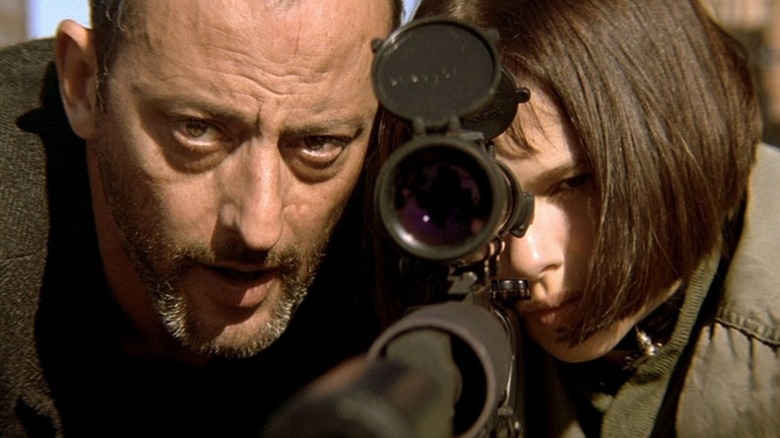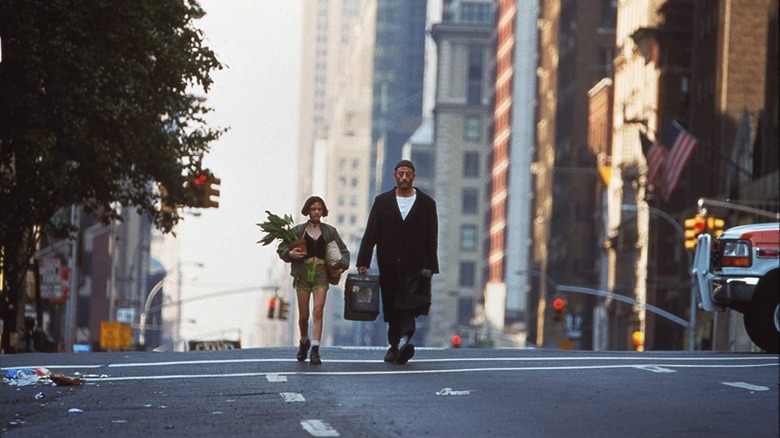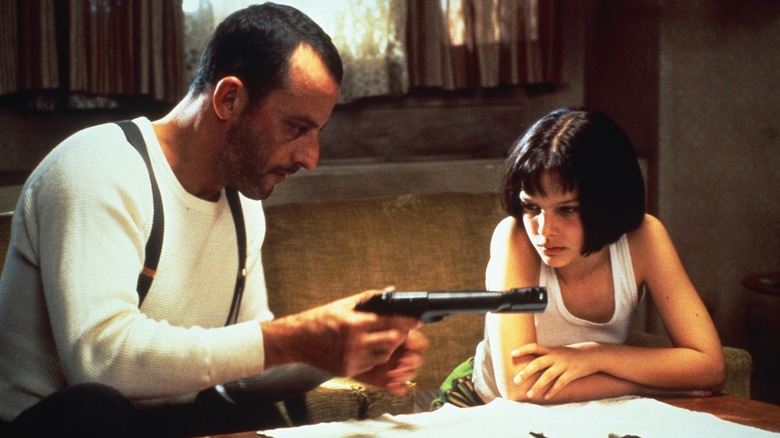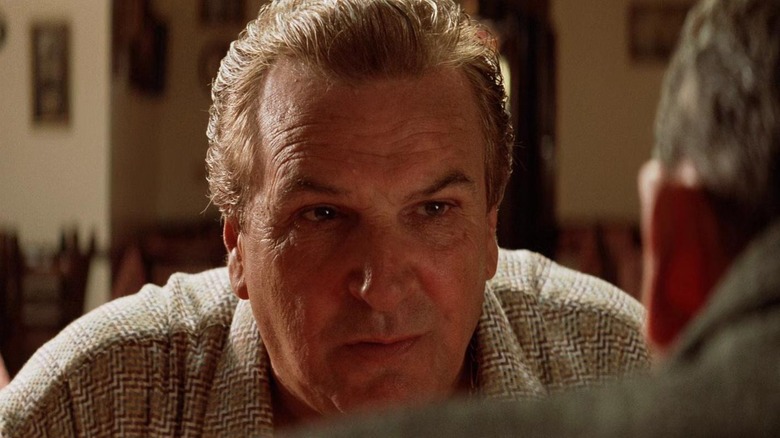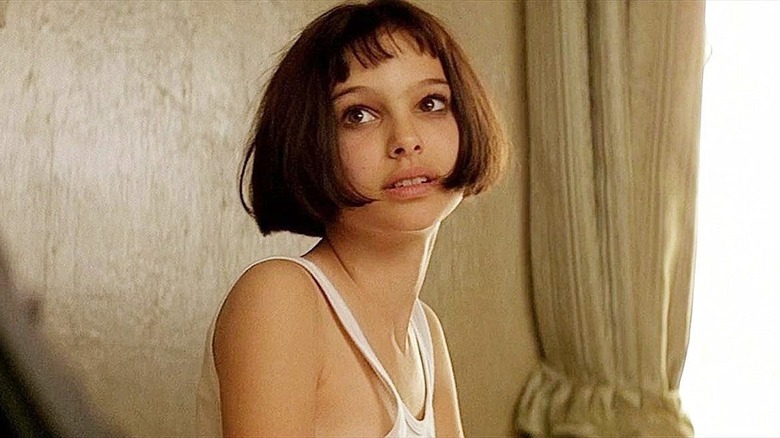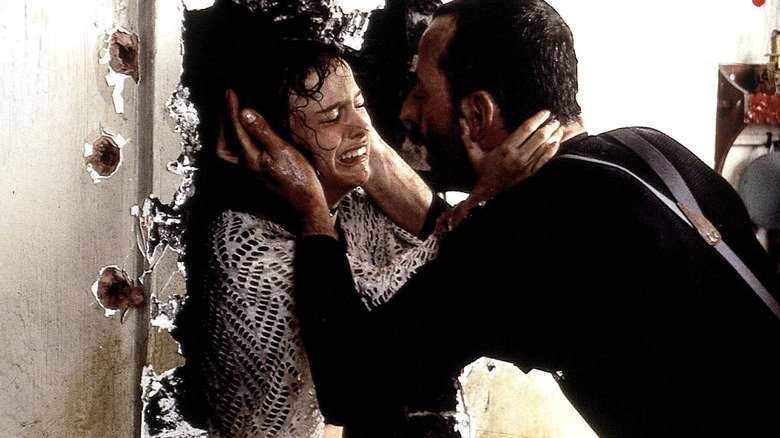Léon: The Professional Ending Explained: Putting Down Roots
Time can really play tricks on you, can't it? I was a teen in the '90s and it still feels like that era of movies was only a few years ago, but then I'll suddenly start spluttering on my coffee when it hits me that films like "Seven," "Boogie Nights," and "Fight Club" are all over 20 years old. That said, it's crazy to see how dated certain aspects of some old favorites are nowadays; the '80s were bad, but it sometimes seems like writers and directors in the '90s were challenging themselves to find whole new levels of inappropriateness.
There are plenty of articles on this subject, listing the '90s flicks that haven't aged well or are just plain problematic these days. There are plenty of moments to choose from: Robin Williams stalking his kids while disguised as an old lady in "Mrs. Doubtfire;" Ace Ventura trying not to vomit after finding out he kissed a transgender person; the "American Pie" boys setting up a webcam so they can spy on a fellow student while she undresses, and a specific Best Picture winner that we'll come to later.
One movie miraculously absent from so many lists is "Léon: The Professional." I thought the premise of a Gump-like hitman shacked up with a 12-year-old girl was pretty iffy back in the day, even before I saw the director's cut and found out about Luc Besson's love life. I'm normally in favor of separating art from artist to a certain degree, but that becomes impossible in the case of this movie. Perhaps more than any other film I can think of, the longer cut and knowledge of the director cast a very different light on this movie's finale.
So what happens in Léon again?
Léon (Jean Reno) is a solitary "cleaner," or contract killer, living a spartan existence in New York. Ruthless yet childlike, he whiles away his downtime watching old Technicolor musicals and caring for his plant, waiting for new assignments from a shady mob boss called Old Tony (Danny Aiello). He keeps to himself, but his whole life changes when corrupt DEA agents, led by the pill-popping Norman Stansfield (Gary Oldman), gun down the family next door because the father is stealing from their stash. The only survivor is 12-year-old Mathilda (Natalie Portman), to whom Léon reluctantly gives shelter.
As an abused child, Mathilda hated her dysfunctional family — except for her younger brother. When she finds out Léon is a hitman, she pleads with him to teach her the skills she needs to seek vengeance. Leon is initially perturbed by having a young girl hanging around his apartment, but they soon form a bond. He eventually gives in and trains her how to use various weaponry in exchange for her cleaning his apartment, and it doesn't take her long to develop a huge crush on him.
Mathilda, still grieving her brother's murder, grows impatient and sneaks into Stansfield's office with a big bag of guns to take him down and enact her revenge. But Stansfield catches her, forcing Léon to single-handedly storm the building and rescue her, killing several agents in the process. Stansfield is enraged and visits Old Tony to find out who the hitman is, beating Léon's whereabouts out of the older man. The stage is set for a final showdown where Léon faces impossible odds. Can he shoot his way out, or is this the end of his short-lived happiness with Mathilda?
Does Léon still hold up?
If you're able to watch "Léon" without thinking about it too much or finding out anything about its director, then yes, it holds up just as well as any other action classic from the '90s, with Besson displaying a rhythmic control of its thrilling set pieces, complimented by the sleek cinematography and a hypnotic score. The performances are great: Reno believably switches between simple-minded puppy dog and relentless killer, while Natalie Portman is exuberant in her screen debut. Gary Oldman is wonderfully demented in his best over-the-top villain mode, and Aiello brings complexity to the small role of Old Tony. Paradoxically, the relationship between Léon and Mathilda is what makes the movie so emotionally engaging, but that's where things get tricky.
"Léon" brazenly sexualizes Mathilda throughout, with the camera frequently lingering on Portman's body. It's something that she spoke out about in 2020 (via People):
"I was definitely aware of the fact that I was being portrayed ... as this 'Lolita' figure. Being sexualized as a child, I think took away from my own sexuality because it made me afraid."
Several scenes that sat uncomfortably with test audiences were removed for the theatrical cut, but there are still several very questionable moments, most notably when Mathilda plays dress-up and mimics Madonna and Marilyn Monroe. Reno's performance is ambiguous, but it always scanned for me like a man attracted to a young girl who is uncomfortably wrestling with temptation.
Putting aside their relationship for a second, "Léon" is pretty messed up. It's the story of an abused kid whose family is slain before she moves in with a 40-something hitman who teaches her how to kill people. Besson makes a fairytale out of it, but there's a huge disconnect between its dark storyline and popcorn presentation.
The Besson factor
It's interesting to consider "Léon" alongside "American Beauty," the Best Picture Oscar winner now regularly called out as one of the most problematic films of the '90s. In that film, Kevin Spacey plays a middle-aged man who tries to seduce his teenage daughter's best friend. The creep factor is exacerbated by subsequent allegations made against the actor, but the film's strangely reverent approach to his character's dilemma was a bit dodgy in the first place.
In contrast, "Léon" is a movie that many people still love uncritically, probably getting a pass where "American Beauty" doesn't because it focuses on a pubescent girl chasing a much older guy, rather than the other way around. The general argument in its favor is that even if Léon feels something sexually towards Mathilda, he doesn't act on it. So no harm, no foul, right?
The real answer seems murkier. Besson met child actor Maïwenn Le Besco when she was just 12. They started dating when she was 15 and he was 32, then married in 1992 when she was 16 and pregnant with their daughter. She later claimed their relationship was the basis for "Léon." An early draft of Besson's screenplay, dated 1993, includes a scene where Léon and Mathilda have sex, describing it as a joyous and beautiful moment. This totally upends the aforementioned "no harm, no foul" argument, and leaves us wondering whether Besson is exploring Léon's dilemma for dramatic purposes, or if he actually finds the character's relationship to be something more. Either way, it's troubling.
What's the deal with Old Tony?
Old Tony (Danny Aiello) and Léon go back years. Tony took him under his wing when he first arrived in the States and now acts as his boss, mentor, and personal banker. While he cares about the monosyllabic hitman, it's also obvious that he is taking advantage of Léon's simple nature. Tony is holding onto Léon's money from an untold number of contracts, supposedly keeping it safe for him. In the meantime, he dishes out a few grand to Léon here and there for him to "have some fun."
Maybe Tony is true to his word, but that certainly isn't how it comes across. Does he still even have Léon's money available? Or is he half-hoping the hitman will get killed on a job so he can keep the cash, no questions asked?
Léon complicates the arrangement by asking Tony to give his money to Mathilda if he dies. Tony can barely look Léon in the eye, so it seems unlikely he will keep his promise. Instead, he gives Mathilda the same old blather about how the money is all hers but it's safer with him than in the bank, before fobbing her off with a hundred dollars until next month. He'll always have an excuse not to give her the full amount. After all, what is she going to do? Go to the cops?
On top of betraying Léon's trust regarding finances, Tony also gives him up to the bad guys. Judging by the bruises on his face at the end of the movie, at least it looks like he didn't give out the information easily.
Is it still implied that Léon and Mathilda sleep together?
This very much depends on which version you watch. One scene in the theatrical cut is very suggestive; as we enter the last act, Mathilda has persuaded Léon to sleep in a bed rather than in an armchair as usual. The next morning, he wakes up to find her sitting on the edge of the bed in her underwear. I always thought this strongly implied they had slept together.
The director's cut includes a scene that was too much for test audiences. Mathilda tells Léon she wants to lose her virginity to him, but he says he can't, recounting the story of his first love back in Italy when he was a teenager. The girl's dad didn't want his daughter to see Léon, and he murdered his own daughter when he found out the two planned to run away together. Léon then took revenge before fleeing to America.
Tellingly, Léon doesn't reject Mathilda by saying anything like "Sorry, you are way too young and I'm not into kids." He gives her a tearful reason as to why he wouldn't make a good lover. It feels like Besson tries to use this backstory to explain Léon's emotional immaturity and close the age gap (mentally, at least) by suggesting the trauma of losing his first love froze him as a teenager.
Mathilda accepts the story but still insists they share a bed, dropping the seduction routine altogether and cuddling up to Léon like a little girl with her dad. Léon still looks a bit uncomfortable, but it is clear the moment is over. I can see why the scene was cut, but chopping it unintentionally adds some ambiguity over whether they have sex or not. (Once again, this is all troubling.)
Is Léon in love with Mathilda?
In the climactic scene of "Léon," Stansfield lays siege to Léon's apartment with dozens of heavily armed cops. Léon uses his elite hitman skills to thwart the first few waves, but the odds are impossible and he can only hold out for so long. Knowing this, he creates an escape route for Mathilda, busting through the wall into a ventilation shaft with an ax. Sending his potted plant down first, he tells Mathilda to meet him at Tony's in an hour. When she realizes he isn't going with her, she refuses to go. Leon reassures her by saying she has given him a taste for life and they will be happy together once this is all over. His last words to her are "I love you."
On a purely practical level, Léon is using these loving words to calm Mathilda down enough to make a getaway, knowing that if she stays even a few seconds longer, she could be killed in the next onslaught. It's also totally natural to think that he might have formed a purely platonic love for her as they form such a strong bond over the course of the movie.
His words come across as more fatherly than anything else, but once again, Besson's icky presence calls the nature of the character's love into question. In their final moments together, is he finally admitting that he reciprocates her romantic feelings for him?
With Mathilda out of the way, Léon improvises a way out of the apartment but is spotted by Stansfield, who shoots him in the back. Ever the professional, Léon is at least half-anticipating this, using his grenade belt to take Stansfield out with him and gain revenge on Mathilda's behalf.
Putting down roots
Until the day Mathilda knocks on his door, Léon leads a lonely existence. His only friend is his beloved potted plant because it has no roots (just like him, see?). Taking care of the plant is one of his few simple pleasures, and it is one of the few possessions he takes along whenever he needs to shift location.
Beyond her crush, Mathilda perhaps senses a kinship with Léon because she feels lonely, too. Her home life is pretty miserable with a dad who knocks her about, a negligent stepmother, and a mean stepsister. Other than her little brother, she feels totally unloved, a feeling probably reinforced by her parents trying to send her away to a school for difficult young girls. Once her kid brother is murdered, Mathilda becomes rootless as well.
Putting aside the creepiness of the film's romantic angle and the hitman training stuff, Léon and Mathilda have a good influence on one another. She makes him feel safe and normal enough to try sleeping in a bed rather than propped up in a chair, while doing chores and training with Léon gives Mathilda a sense of home, purpose, and positive discipline that she didn't have with her family.
In the end, Mathilda returns to the Girls' School and plants Léon's beloved potted plant outside. "I think we'll be okay here, Léon," she says, as if some part of his spirit remains in the shrub. By giving him some roots, we also get the sense that she is ready to grow some of her own, committing to the school and starting a better life in the wake of tragedy.
